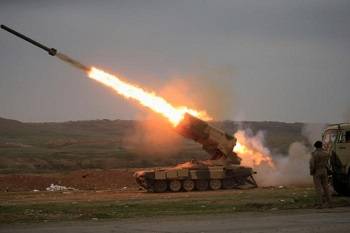Twelve people, including women and children, are being treated for possible exposure to chemical-weapons agents in Mosul, where ISIL is fighting off an offensive by US-backed Iraqi forces, according to the UN.
The UN's World Health Organization said in a statement on Saturday that with partners and local health authorities it activated "an emergency response plan to safely treat men, women and children who may be exposed to the highly toxic chemical".
Lise Grande, the UN humanitarian coordinator in Iraq, called for an investigation.
"This is horrible. If the alleged use of chemical weapons is confirmed, this is a serious violation of international humanitarian law and a war crime, regardless of who the targets or the victims of the attacks are," she said in a statement.
The UN said all 12 patients had been received since March 1 for treatment which they are undergoing in Erbil, the capital of Iraq's Kurdish region, east of Mosul.
Four of them are showing "severe signs associated with exposure to a blister agent".
The patients were reportedly exposed to the chemical agents in the eastern side of Mosul.
Reporting from Erbil, Al Jazeera's Stefanie Dekker, who visited the hospital where the patients were being treated, said: "I saw a young boy, about eight or nine years old, and his entire body had burn marks, black and brown marks, all across his body.
"The manager of the hospital told us when these patients came in, the emanated a very strong odor, which is one of the side effects of being affected by these chemical gases."
The hospital manager was "certain that some form of chemical gas has been used", our correspondent said.
So far, no investigation into the use of chemical weapons has been launched.
The International Committee of the Red Cross (ICRC) said on Friday that five children and two women were receiving treatment for exposure to chemical agents.
The ICRC statement did not say which side used the chemical agents that caused blisters, redness in the eyes, irritation, vomiting and coughing.
Iraqi forces captured the eastern side of Mosul in January after 100 days of fighting, and launched their attack on the districts that lie west of the Tigris River on February 19.
Humanitarian crisis
The suspected use of chemical weapons comes as rapidly increasing flow of people pours out of western Mosul, fleeing fierce battles between Iraqi security forces and ISIL fighters.
More than 50,000 people have fled the city's west since the push to retake it was launched on February 19, according to Jassem Mohammed al-Jaff, Iraq's minister of displacement and migration.
On Saturday, Jaff criticized the UN's efforts in helping the displaced.
"Unfortunately, there is a clear shortfall in the work of these [UN] organizations," he said. "The United Nations talks a lot but the efforts being made are little, despite the huge amount of money in their possession."
For its part, the UN said it is working as fast as possible to help those displaced.
UN agencies have been providing shelter, food and other assistance to Iraqis since the battle for Mosul began.
"The top priority for humanitarians is to make sure that there is sufficient capacity at emergency sites to deal with the number of civilians who are fleeing western Mosul," said Grande, the UN humanitarian coordinator.
"In the past several weeks, we have been rushing to... construct that capacity, and we are redoubling our efforts now."
PHOTO CAPTION
An Iraqi Army officer (R) uses his mobile phone to film a rocket launched during a battle in Mosul, Iraq March 3, 2017. REUTERS
Al-Jazeera


 Home
Home Discover Islam
Discover Islam Quran Recitations
Quran Recitations Lectures
Lectures
 Fatwa
Fatwa Articles
Articles Fiqh
Fiqh E-Books
E-Books Boys & Girls
Boys & Girls  Ramadan
Ramadan Fatwa Audios
Fatwa Audios Month of Mercy
Month of Mercy Women
Women Eed Al- Fitr
Eed Al- Fitr Food Recipes
Food Recipes Videos
Videos

 Prayer Times
Prayer Times












